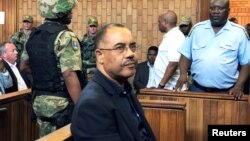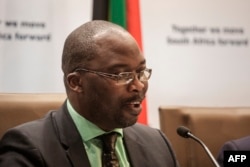South Africa's justice minister says Mozambique's former finance minister will be extradited to his native Mozambique — instead of to the U.S., as requested by U.S. officials — to face charges for his alleged involvement in a massive loan scandal that crippled that nation's economy.
Former Mozambican finance minister Manuel Chang, who was arrested in transit through Johannesburg in December, is wanted by both the U.S. and Mozambique for his alleged role in a $2 billion debt scandal that has wrought economic chaos in the southern African nation.
Both the U.S. and Mozambique filed petitions to extradite Chang, and last month a Johannesburg court referred the case to South Africa's justice minister, Michael Masutha, who said in his statement that he was "satisfied that the interest of justice will be best served by acceding to the request by the Republic of Mozambique."
U.S. officials declined to comment when contacted by VOA.
Nation suffering
But Chang faces a mixed reception at home.
While the Mozambican government clearly wants him back, most citizens do not, because they fear he will not face the same level of scrutiny as he would in an American court, says prominent Mozambican political commentator Fernando Lima.
"I'm 100 percent sure that all different official departments, including the attorney general's office, is very happy with the outcome announced last night by the minister," he told VOA. "On the opposite side, the popular reaction has been very, very negative."
The secret loan led the coastal nation to suffer a debt crisis so severe it has deprived citizens of the most essential services, like road maintenance and well-maintained hospitals.
It's not clear what charges Chang would face in Mozambique — South African prosecutors say they did not receive a Mozambican charge sheet. The U.S. indictment, issued by the Eastern District of New York, accuses Chang and others of "intentionally divert(ing) portions of the loan proceeds to pay at least $200 million in bribes and kickbacks to themselves, Mozambican government officials and others."
Earlier this week, a former Credit Suisse banker involved in the case pleaded guilty in a New York court to a charge that she helped launder money as part of the scheme.
Accountability
Human Rights Watch researcher Zenaida Machado told VOA that she feels the venue of Chang's trial is irrelevant — what matters, she says, is that he faces a fair trial.
"I'm not sure if the point is whether he's sent to Mozambique or to the U.S.," she said. "And I would really avoid having that kind of conversation, because it kind of suggests that one country or another is better for human rights, which is not the point of the work we do. What would I prefer to focus on is on the need to hold people accountable for the damage they have caused to millions of Mozambicans."
The government has arrested 20 or so people in connection with the scandal in recent months, but no one has been tried. In fact, Machado said, it's not clear what will happen to Chang once he returns home.
"The immunity must be removed from him," she said. "So, the appeal we have for the parliament is that they do what they should to. Which is to allow the authorities to arrest Mr. Chang, and to take him to justice so he has his chance to prove whether he's innocent or not."









